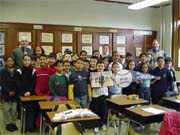George Clough grew up as a dyed-in-the wool Brooklyn Dodgers fan. As a youngster growing up in Jersey City, Clough, a teacher in the North Bergen school district for almost 30 years, loved that the Dodgers would play some of their games in Jersey City’s Roosevelt Stadium.
And Clough’s hero was Jackie Robinson.
“I lived in an integrated part of Jersey City,” Clough said. “We didn’t know colors in my neighborhood. We had people of all races. I couldn’t even envision what it was like in other parts of the country.”
At that time, the late 1940s and 50s, African-Americans were not treated fairly in most of the country. Probably the person most recognized for unfair treatment was Jackie Robinson, who broke the color barrier and became the first African-American to play major league baseball in 1947, but was brutally ridiculed and abused everywhere he traveled with the Dodgers.
As a sign of acceptance, Harold “Pee Wee” Reese, the Dodgers’ team captain, made a gesture to welcome Robinson to the Dodgers. During one game, Reese walked out onto the field with his arm around Robinson’s shoulder. Never before had someone of prominence had made such a celebrated and pronounced public gesture.
The gesture of acceptance was so widely recognized that a story was written about the two players, called “Teammates,” an essay that appeared in the McGraw Hill fourth grade reader that Clough uses in his classroom at North Bergen’s Robert Fulton School.
It was only fitting that Clough should use such a poignant tale of the two Dodger teammates, considering how much Clough loved – and still loves – the Dodgers.
The class thoroughly enjoyed the story, including the historical importance of Robinson’s acceptance into major league baseball and his overall significance in history, not just in sports.
“I learned how integration is very important and segregation is very bad,” said Stav Berlinblav. “I got to know a lot about Jackie Robinson and how important he was to everyone.”
“I learned that black people deserve to be treated the same as everyone else,” Jonathan Acevedo said. “He was a remarkable man. I have more of an appreciation of what he was able to do and how tough it was.”
Ingrid Nunez echoed those thoughts.
“Blacks and whites weren’t allowed to do the same things,” Nunez said. “The blacks had to ride in the back of the bus. They weren’t allowed to drink from the same water fountain. They weren’t allowed to eat in the same restaurants, stay in the same hotels. They were not treated equally.”
The students were so moved by the emotional story that they wanted to do something extra. So they pooled their efforts to raise money to donate to the Jackie Robinson Foundation, a non-profit organization that is set up to insure that African-Americans are given the same rights as others, especially in terms of education.
The students held a bake sale. They sold water and soft drinks. They hawked ice cream and snacks. Clough wrote letters to several sports personalities and teams and asked for items of memorabilia that could be raffled off.
“Tommy Lasorda sent some autographed programs,” Clough said of the famed Dodger manager. “The Newark Bears sent tickets. The Trenton Thunder sent items. The Nets, the Devils, they all sent something.”
A famed sports artist, Bill Goff, sent a framed lithograph of a painting he drew of Robinson sliding into home. The lithograph was also auctioned off.
After it was over, Clough collected all the money.
“I just kept putting the money in plastic bags,” Clough said. “I didn’t even know how much until we sat and counted it.”
The result? The kids had collected $2,443, which will be sent to the Robinson Foundation in the coming weeks. Rachel Robinson, the widow of the Hall of Fame hero, personally wrote letters of gratitude to each and every student. She also sent the children some videos of Robinson for them to enjoy in the classroom.
“That was an amazing figure,” Clough said. “I was even shocked myself with how much money we raised.”
“It felt really good that we were able to get so much,” said Danissa Smith. “It was all for a very good cause.”
Some of the students really got caught up in the efforts. One student, Joseph Bufis, actually made a Brooklyn Dodgers jersey with Robinson’s famed No. 42 on the back.
“I felt sorry that everyone didn’t like Jackie Robinson,” Bufis said. “He should have been loved not only because he was a great baseball player, but because he was a great person.”
Michael Davis was impressed how Reese and Robinson remained close friends until Robinson’s death in 1972. Reese died in 1997.
“I thought that was the most interesting thing, that their friendship lived on,” Davis said.
Clough said that he was fortunate enough to have met Reese, who also once wrote personal letters to children in his class a few years ago. He also had Robinson’s autograph, but it was somehow lost over the years.
“Pee Wee was a tremendous man,” Clough said. “I would have loved to have known Jackie.”
It’s safe to say that Robinson would have loved to have known Clough’s students as well.
